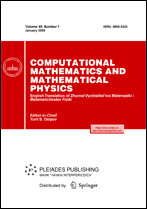|
Computation of zeros of the alpha exponential function
S. L. Skorokhodov
Dorodnicyn Computing Center, Federal Research Center “Computer Science and Control”, Russian Academy of Sciences, Moscow, Russia
Abstract:
This paper deals with the function $F(\alpha; z)$ of complex variable $z$ defined by the expansion $F(\alpha; z)=\sum_{k=0}^\infty\frac{z^k}{(k!)^\alpha}$ which is a natural generalization of the exponential function (hence the name). Primary attention is given to finding relations concerning the locations of its zeros for $\alpha\in(0, 1)$. Note that the function $F(\alpha; z)$ arises in a number of modern problems in quantum mechanics and optics. For $\alpha=1/2,~1/3,~\dots$, approximations of $F(\alpha; z)$ are constructed using combinations of degenerate hypergeometric functions $_1F_1(a; c; z)$ and their asymptotic expansions as $z\to\infty$. These approximations to $F(\alpha; z)$ are used to approximate the countable set of complex zeros of this function in explicit form, and the resulting approximations are improved by applying Newton’s high-order accurate iterative method. A detailed numerical study reveals that the trajectories of the zeros under a varying parameter $\alpha\in(0, 1]$ have a complex structure. For $\alpha = 1/2$ and $1/3$, the first $30$ complex zeros of the function are calculated to high accuracy.
Key words:
alpha exponential function, degenerate hypergeometric function, asymptotic expansions, complex zeros, Newton's method.
Received: 22.06.2016
Citation:
S. L. Skorokhodov, “Computation of zeros of the alpha exponential function”, Zh. Vychisl. Mat. Mat. Fiz., 57:6 (2017), 907–920; Comput. Math. Math. Phys., 57:6 (2017), 905–918
Linking options:
https://www.mathnet.ru/eng/zvmmf10543 https://www.mathnet.ru/eng/zvmmf/v57/i6/p907
|


| Statistics & downloads: |
| Abstract page: | 428 | | Full-text PDF : | 91 | | References: | 75 | | First page: | 50 |
|





 Contact us:
Contact us: Terms of Use
Terms of Use
 Registration to the website
Registration to the website Logotypes
Logotypes







 Citation in format
Citation in format 